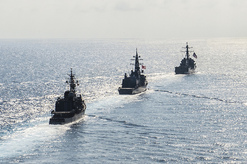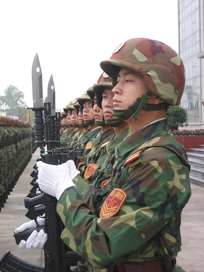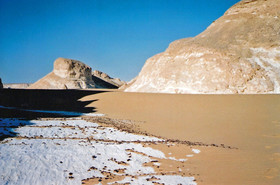 Military patrols in S. China Sea Military patrols in S. China Sea Tensions ramp up another notch in the South China Sea as Malaysia has protested the incursion of fishing boats into what they claim is their exclusive economic zone (EEZ). A flotilla of one hundred Chinese fishing boats were chased out of the Malaysian waters in March. For their part, the Chinese have maintained that they are simply fishing in their traditional waters. The Malay minister of national security is not so sure. It could be interpreted as a message that China is pushing for control of the disputed sea. Malaysia is building a new naval base in that area that will have helicopters, drones and a task force. The stated purpose of the new base is to ensure that extremists will not cause social disruptions. The S. China Sea is claimed in part by seven nations, some with overlapping claims. China has made the biggest share. To bolster their claims they have embarked on a programme of island building on coral reefs in the area and militarized them. With an increasingly strong hold on some of the sea, they are now making moves to declare the airspace theirs to control -- Air Defense Identification Zone (ADIDZ). This would require passing aircraft to identify themselves and request permission to continue. This, the US Airforce has refused to do. As well, the shipping through the sea, worth trillions of dollars per year and not now under the PRC’s control. Malaysia is not the only country finding difficulties with the PRC fishing fleets. Vietnam has had hostile encounters with the Chinese navy while trying to enforce their claims to the sea. Indonesia has gone one further and has taken to blowing up the seized Chinese fishing vessels. To date 174 vessels have been blown up. The Philippines have had their fishermen harassed by Chinese boats using water cannons. Since their elections the harassment has eased off as Pres. Xi has made friendly gestures to the new Philippine president Duterte. It may be inspired by the recent announcements that the US and the Philippines will be conducting joint patrols in the disputed sea. The Philippines have taken their claims to an international court for adjudication but the PRC does not recognize its status. Sources: Marine Executive South China Morning Post Stars and Stripes Reuters
0 Comments
China seems to always have civil discontent bubbling just below the surface. A military force loyal to the Party is essential to maintain power. With the massive loss of paper wealth in the past few weeks on the Chinese stock market, the slowing economy and lay-offs are potential flashpoints.
Speculation has been rife as to why the change in the PLA is happening now. One reason may be that the PLA is not modern in its organization and is unprepared to meet an external threat in modern times. The PRC is involved in several territorial disputes with its Asian neighbours. It has been accused of land grabs in the S. China Sea. Rhetoric has been exchanged with the US regarding the PRC’s territorial claims as well. A modern military must be efficient in information gathering and dispersing that knowledge to the correct parties. And not least is the fact that the PLA has no experience fighting a modern enemy. Since the 1950s the Party has maintained control and quashed opposition but a civilian opposition is not the challenge of facing trained and experienced foes. Aside from tightening control to ensure loyalty to the central party, the reforms may be a way to root out corruption within the PLA. President Xi has made it public policy to expose corrupt officials. It looks as if the anti-corruption campaign is serious. Fourteen PLA generals have been named as corrupt and face court-marshal. Some have already been expelled from the Party which spells disaster on a personal level. In any case, it is interesting times. Sources: Marine Corps Times The Diplomat The Diplomat Comments made on twitter regarding this incident to the BBC support the contention that the area of attack was a “safe zone”.
For instance Western Desert Tours has been operating in the area offering tours of the sand and oasis. It received an award of excellence in 2014 from the customer rating service Trip Advisor. Many other companies are offering safaris to the area. Egypt borders on states in N. Africa that have become unstable in recent years. Libya and Sudan on the west have become conduits for terrorist and counterrevolutionary activities. On the east where most of the attention has been focussed recently, Egypt shares borders with the Palestinian Territories(Gaza Strip) and Israel. The military government has been demolishing homes in the Sinai Desert to prevent unauthorized border crossings. The military there has come under increasingly deadly attacks. Egypt relies heavily on other countries for direct aid to finance itself but it also gains significant foreign currency from its tourist trade. Since the military coup in that country, the tourism industry has declined. At its high point over $12 billion USD was collected from travellers in one year. Sources: The Guardian Reuters |
Barbara McPherson
Blogger, gardener, farmer. Working toward food security and a 30 foot
diet. Addicted to reading. Love this planet, especially my little corner
on Vancouver Island, Canada Archives
October 2016
Categories
All
|



